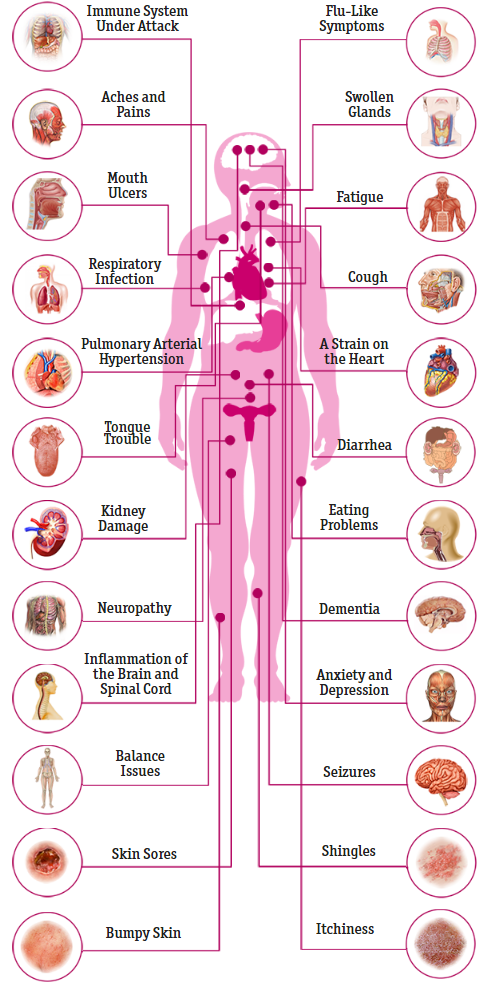The Effects of HIV on the Body
- 17 Feb, 2017
- Written by Team Dr Lal PathLabs
Medically Approved by Dr. Seema
Table of Contents
Once the human immunodeficiency virus (HIV) enters your body, it launches a direct attack on your immune system.
It gradually weakens your natural defenses against disease and infection and can affect every part of your body. Find out how.

Effects of HIV/AIDS on the Body
The human immunodeficiency virus (HIV) seeks and destroys CD4+ cells, a type of T lymphocyte (T cell). T cells are critical to the immune system. They’re responsible for warding off diseases and most infections, including viral infections.
HIV targets the type of cells that would normally fight off an invader like HIV. As the virus replicates, it damages or destroys the infected CD4+ cell and produces more virus to infect more CD4+ cells. Without treatment, this cycle continues in most infected people until the immune system is badly compromised, leaving them open to many serious infections and illnesses. Many of the illnesses that people compromised immune systems get are rare in people with functioning immune systems.
How quickly the virus progresses varies from person to person. Factors like your age, overall health, and how quickly you’re diagnosed and treated can make a difference.
Acquired immunodeficiency syndrome (AIDS) is the final stage of HIV. At this stage, the immune system is severely weakened, and the risk of contracting opportunistic infections is much greater. Not everyone with HIV will go on to develop AIDS.
Importantly, many of the effects described here are related to the failure of the immune system in progressing HIV and AIDS. Many of these effects are preventable with early antiretroviral treatment, which can preserve the immune system. However, for anyone without access to effective antiretroviral treatment, these effects remain possible.
Immune System
 Your immune system prevents your body from acquiring the diseases and infections that come your way. White blood cells defend you against viruses, bacteria, and other organisms that can make you sick.
Your immune system prevents your body from acquiring the diseases and infections that come your way. White blood cells defend you against viruses, bacteria, and other organisms that can make you sick.
When HIV enters the body, it goes straight for the CD4+ T cells that are a lynchpin for the operation of the entire immune system. As the virus infects and kills more of these T cells, your immune system grows weaker, and you become more susceptible to illness.
Early on, symptoms may be mild enough to be dismissed. Within a few months of becoming infected, most people experience a flu-like sickness that lasts a few weeks. Symptoms may include:
- fever
- chills
- night sweats
- diarrhea
- headache
- muscle aches
- joint pain
- sore throat
- rash
- swollen lymph glands
- mouth or genital ulcers
The first stage of HIV is called the acute infection stage. The virus reproduces rapidly at this stage. You may not have much in the way of serious symptoms, but there are usually large quantities of virus in your blood.
Many people are unaware of their HIV status at this point, but the risk of transmission during the acute infection stage is very high. Acute infection may cause flu-like symptoms, including decreased appetite, headache, night sweats, and others.
The next stage is called the clinical latent infection state. On average, it lasts 8 to 10 years. In some cases, it lasts much longer than that. You may or may not have symptoms during this stage.
As the virus advances, CD4 count decreases more drastically. This can lead to symptoms like:
- fatigue
- shortness of breath
- cough
- fever
- swollen lymph nodes
- weight loss
- diarrhea
If HIV infection advances to AIDS, the body becomes prone to opportunistic infections. People with advanced HIV/AIDS are at increased risk of a number of infections, including a herpes virus called cytomegalovirus. It can cause problems with your eyes, lungs, and digestive tract.
Kaposi’s sarcoma, another possible infection, is a cancer of the blood vessel walls. It’s rare among the general population, but common in people who are HIV-positive. Symptoms include red or dark purple lesions on the mouth and skin. It can also cause problems in the lungs, digestive tract, and other internal organs.
HIV/AIDS also puts you at higher risk of developing lymphomas. An early sign of lymphoma is swollen lymph nodes.
Respiratory and Cardiovascular Systems
 HIV increases the risk of colds, influenza, and pneumonias. According to the American Lung Association, HIV/AIDS can lead to opportunistic lung diseases. Without preventive treatment, people with advanced HIV are susceptible to tuberculosis, pneumonia, and a disease called pneumocystis carinii pneumonia (PCP). PCP causes trouble breathing, cough, and fever.
HIV increases the risk of colds, influenza, and pneumonias. According to the American Lung Association, HIV/AIDS can lead to opportunistic lung diseases. Without preventive treatment, people with advanced HIV are susceptible to tuberculosis, pneumonia, and a disease called pneumocystis carinii pneumonia (PCP). PCP causes trouble breathing, cough, and fever.
HIV raises the risk of pulmonary arterial hypertension (PAH). PAH s a type of high blood pressure in the arteries that supply the lungs. It puts added strain on the heart.
If you have HIV and have become immunocompromised (have a low T cell count), you’re susceptible to tuberculosis (TB), a leading cause of death in people who have AIDS. TB is an airborne bacterium that affects the lungs. Symptoms include chest pain and a bad cough that may contain blood or phlegm. Symptoms can linger for months.
Digestive System
 A common HIV-related infection is called candidiasis. Symptoms include inflammation of and a white film on the tongue. It can also cause inflammation of the esophagus, which can make it difficult to eat. Another viral infection that affects the mouth is oral hairy leukoplakia, which causes white lesions on the tongue.
A common HIV-related infection is called candidiasis. Symptoms include inflammation of and a white film on the tongue. It can also cause inflammation of the esophagus, which can make it difficult to eat. Another viral infection that affects the mouth is oral hairy leukoplakia, which causes white lesions on the tongue.
Salmonella infection is spread through contaminated food or water and causes diarrhea, abdominal pain, and vomiting. Anyone can get it, but if you have HIV, you’re at higher risk of serious complications from this infection.
Consuming contaminated food or water can also result in a parasitic intestinal infection called cryptosporidiosis. It affects the bile ducts and intestines. It can be particularly severe and cause chronic diarrhea in people who have AIDS. Cryptosporidiosis infection can occur in people with effective immune systems, but it can become a chronic problem in people with CD4 levels under 200.
HIV-associated nephropathy (HIVAN) is when the filters in your kidneys become inflamed, making it harder to remove waste products from your bloodstream.
Problems with your digestive tract can decrease your appetite and make it difficult to eat properly. Weight loss is a common side effect of HIV.
Central Nervous System
 There are significant neurological complications of AIDS. Even though HIV doesn’t generally directly infect nerve cells, it does infect the cells that support and surround nerves in the brain and throughout the body.
There are significant neurological complications of AIDS. Even though HIV doesn’t generally directly infect nerve cells, it does infect the cells that support and surround nerves in the brain and throughout the body.
All of the mechanisms of HIV-associated neurologic damage aren’t completely understood, but it’s likely that infection of these support cells contribute to nerve injury. Advanced HIV infection can damage nerves (neuropathy). Small holes in the conducting sheaths of peripheral nerve fibers (vacuolar myelopathy) can cause pain, weakness, and difficulty walking.
HIV/AIDS can cause HIV-associated dementia or AIDS dementia complex, two conditions that seriously affect cognitive function.
Toxoplasma encephalitis is another possible complication of advanced HIV. People with AIDS are at increased risk of inflammation of the brain and spinal cord due to this parasite found commonly in cat feces. Symptoms include confusion, headaches, and seizures.
Some common complications of AIDS include memory impairment, anxiety, and depression. In very advanced cases, hallucinations and frank psychosis can occur. Some people experience headaches, balance issues, and vision problems.
Skin
 One of the more obvious signs of HIV/AIDS can be seen on the skin. A weakened immune response leaves you more vulnerable to viruses like herpes. Herpes can cause you to develop sores around your mouth or genitals.
One of the more obvious signs of HIV/AIDS can be seen on the skin. A weakened immune response leaves you more vulnerable to viruses like herpes. Herpes can cause you to develop sores around your mouth or genitals.
People with HIV are at increased risk of shingles, which is caused by herpes zoster, the virus that gives you chickenpox. Symptoms of shingles include a painful rash, often with blisters.
A viral skin infection called molluscum contagiosum involves an outbreak of bumps on the skin. Another condition is called prurigo nodularis. It causes crusted lumps on the skin, as well as severe itching.
To book for a HIV test you can simply visit https://www.lalpathlabs.com/test-for-hiv













